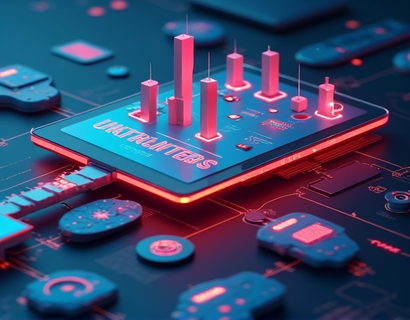Next-Gen Digital Transformation: Leveraging AI and Crypto for Enhanced User Experiences
The digital landscape is undergoing a profound transformation, driven by the convergence of artificial intelligence (AI) and cryptocurrency. This synergy is not just a technological curiosity but a powerful force reshaping how we interact with digital systems and empowering users in unprecedented ways. The integration of AI and crypto is giving rise to innovative applications that are redefining user engagement and setting new standards for technological advancement. This article delves into the transformative power of this merger, exploring its implications and the exciting possibilities it offers for the future of digital experiences.
The Intersection of AI and Cryptocurrency
AI and cryptocurrency are two of the most disruptive technologies of our time, each with the potential to revolutionize various industries. When combined, they create a synergy that amplifies their individual strengths. AI's ability to process vast amounts of data, learn from patterns, and make intelligent decisions complements cryptocurrency's decentralized and secure nature. This combination is leading to the development of smart, adaptive, and highly secure digital ecosystems.
The intersection of AI and crypto is particularly evident in the realm of blockchain technology. Blockchain, the underlying infrastructure of cryptocurrencies, provides a transparent and immutable ledger for transactions. AI can enhance blockchain's capabilities by optimizing transaction processing, predicting market trends, and improving security measures. For instance, AI algorithms can detect and prevent fraudulent activities by analyzing transaction patterns and identifying anomalies in real-time.
Enhanced Financial Empowerment
One of the most significant impacts of merging AI and crypto is the enhancement of financial empowerment for individuals. Traditional financial systems often exclude a large portion of the global population due to high barriers to entry and complex regulatory environments. Cryptocurrency, with its decentralized nature, offers a more inclusive alternative. AI can further democratize access to financial services by creating intelligent systems that provide personalized financial advice, automate investment decisions, and facilitate peer-to-peer transactions without intermediaries.
For example, AI-driven financial platforms can analyze a user's financial behavior and provide tailored recommendations for saving, investing, and managing debt. These platforms can also enable micro-lending and micro-investing, allowing individuals with limited capital to participate in the global economy. By leveraging AI, these platforms can continuously learn and adapt to user needs, offering more accurate and relevant financial solutions.
User-Centric Digital Experiences
The fusion of AI and crypto is not only about financial empowerment but also about creating user-centric digital experiences. AI can enhance user interactions by providing intuitive and personalized interfaces. In the context of cryptocurrency, this means developing user-friendly wallets, exchanges, and other financial tools that cater to both tech-savvy users and those new to the space.
AI-powered chatbots and virtual assistants can offer real-time support and guidance, helping users navigate complex financial concepts and transactions. These AI assistants can understand natural language queries, provide explanations in simple terms, and even predict user needs based on their behavior. This level of personalization ensures that users feel supported and confident when engaging with digital financial services.
Security and Privacy Enhancements
Security and privacy are paramount in the world of cryptocurrency. AI can significantly bolster these aspects by implementing advanced threat detection and response systems. Machine learning algorithms can analyze vast datasets to identify potential security risks and vulnerabilities, enabling proactive measures to protect user assets.
Moreover, AI can enhance privacy by developing sophisticated encryption methods and zero-knowledge proofs. These technologies allow users to verify transactions without revealing sensitive information, ensuring that their data remains confidential. The combination of AI and blockchain can create a robust framework for secure and private digital interactions, building trust and encouraging wider adoption of cryptocurrency.
Innovative Applications in Various Sectors
The potential applications of AI and crypto extend far beyond finance. In the healthcare sector, AI can analyze medical data stored on blockchain to improve diagnostics and treatment plans. AI-driven analytics can identify patterns and correlations that human doctors might miss, leading to more accurate and timely interventions. Cryptocurrency can facilitate secure and private sharing of medical records, ensuring patient data is protected while still accessible to authorized healthcare providers.
In the supply chain industry, AI and blockchain can create transparent and efficient systems for tracking products from origin to destination. AI can optimize logistics by predicting demand, reducing waste, and streamlining operations. Blockchain ensures that every step of the process is recorded and verifiable, enhancing trust and accountability among all parties involved.
The real estate market is another area where AI and crypto can make a significant impact. AI can analyze market trends, property data, and economic indicators to provide insights for investors and buyers. Cryptocurrency can simplify property transactions by reducing the need for intermediaries and lowering transaction costs. Smart contracts on blockchain can automate and secure the transfer of property ownership, ensuring that all conditions are met before completing the transaction.
Challenges and Considerations
While the potential of AI and crypto is immense, there are several challenges and considerations that must be addressed. One of the primary concerns is regulatory uncertainty. The rapid evolution of these technologies often outpaces existing laws and regulations, creating a complex and sometimes hostile environment for innovation. Stakeholders must work closely with policymakers to develop frameworks that balance innovation with consumer protection and financial stability.
Another challenge is the technical complexity involved in integrating AI and crypto. Developing robust and scalable systems requires expertise in both domains, which can be a barrier for many organizations. Education and collaboration are essential to overcome this hurdle. Additionally, there is the issue of public perception and trust. Many people are still skeptical about cryptocurrency due to its volatility and association with illicit activities. AI can help mitigate these concerns by enhancing transparency and security, but ongoing education and communication are crucial.
The Future of Digital Transformation
The convergence of AI and crypto is just the beginning of a new era in digital transformation. As these technologies continue to evolve, we can expect even more innovative applications and use cases. The key to harnessing their full potential lies in fostering a collaborative ecosystem where developers, researchers, and users work together to push the boundaries of what is possible.
For tech-savvy individuals, AI enthusiasts, and digital innovators, the future is bright. The integration of AI and crypto offers a platform for creating smart, secure, and user-friendly digital experiences. Whether you are developing new applications, exploring investment opportunities, or simply curious about the latest advancements, this field holds endless possibilities. Embracing this transformation can lead to significant advancements in user engagement and technological progress, shaping a more connected and empowered digital world.











































